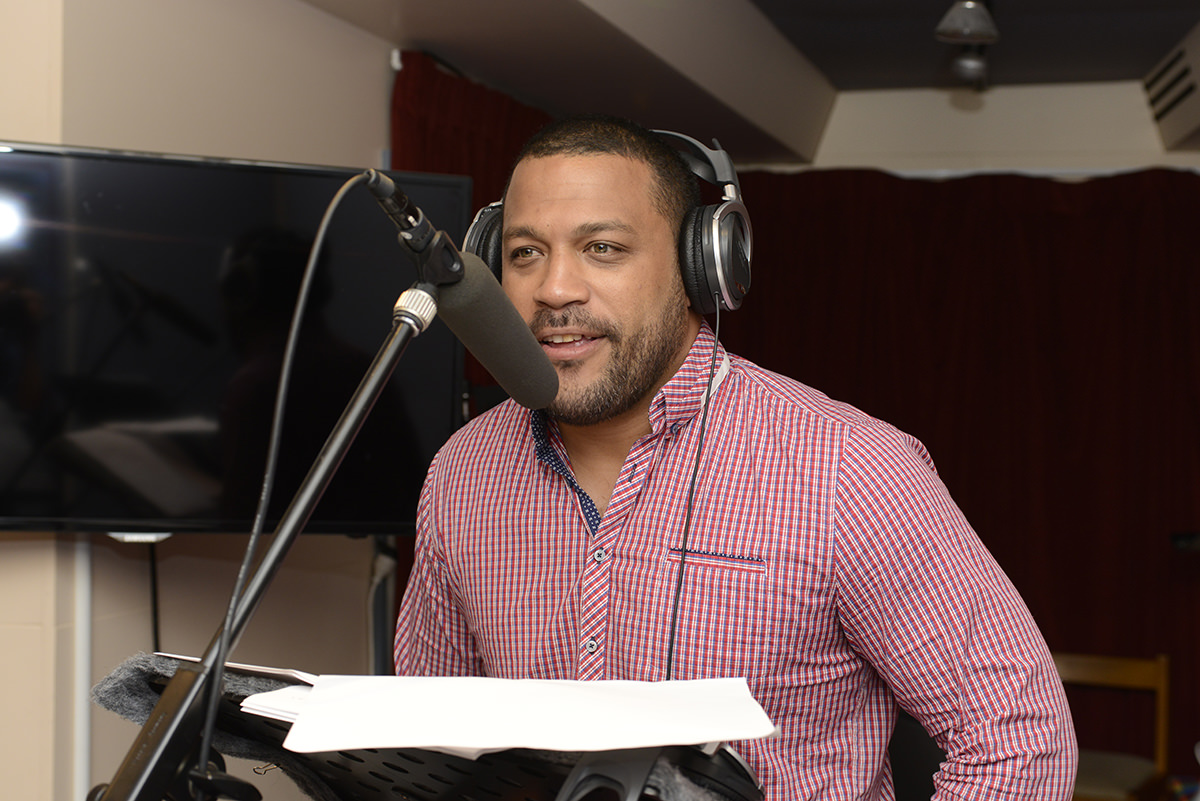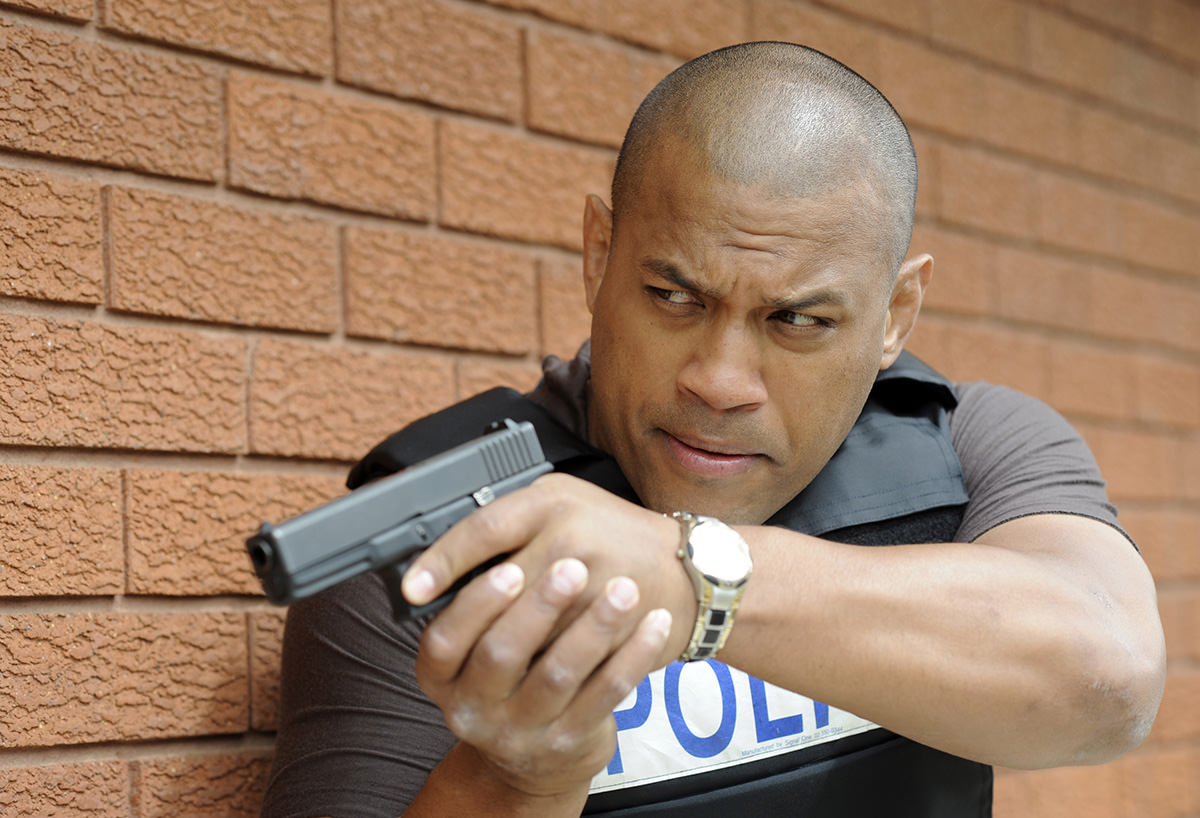Aaron Fa’Aoso: footy, producing and Indigenous stories
He’s a familiar face on the big and small screen. Yet after a decade in the industry, Aaron Fa’Aoso is looking towards the future of Indigenous storytelling with single-minded focus.
 Aaron Fa'Aoso voices Old Dog in Little J & Big Cuz
Aaron Fa'Aoso voices Old Dog in Little J & Big Cuz
Growing up in a “big Torres Strait Islander community” in North Queensland, Aaron Fa’Aoso knew what his future looked like and that future was football. “To play football, that was it: to play for your club, to play State Of Origin, and to play for Australia,” he says. “The whole film and television industry introduction didn’t come till years later.” Things seemed on track for Aaron’s footy career when he graduated high school and moved from Cairns to Sydney, with a contract at the Canterbury Bulldogs rugby league club. “Once I got to Sydney, I just saw all these other opportunities.”
Fast forward some 10 years and Fa’Aoso has become somewhat of a stalwart of the screen industry. Popping up on Aussie procedurals such as Sea Patrol, City Homicide and East West 101, he built up an impressive body of work before making the jump to star and producer of The Straits. Based on Fa’Aoso’s original idea and developed into a series concept by playwright Louis Nowra, The Straits was dubbed “The Sopranos of the Top End” by critics. “It was a concept I pitched to (producers) Helen Panckhurst and Penny Chapman at the time, who were my mentors and who I came to know through the project that introduced me to the industry: RAN: Remote Area Nurse on SBS,” he says. “It was just a whole hands-on process of developing the series from start to finish. I didn’t realise the magnitude nor the workload and the expectation. I had been in the industry five years at that time and all of a sudden I was making my own television show.” The Straits was a 2012 series shot in North Queensland and funded by Screen Australia and ABC TV. Starring veteran actor Brian Cox, the crime drama featured a host of Australian and New Zealand talent such as Jimi Bani, Suzannah Bayes-Morton and Once Were Warriors’ Rena Owen playing smugglers operating out of the Torres Strait Islands. Due to the multiple roles he was juggling on the program from concept to execution, Fa’Aoso says the experience was “extremely stressful” but also one that helped shaped his future in the business. “It continues to hold me in good stead,” he says. “That experience has helped me so much for current and future productions now.”
“It was almost a natural progression into this industry.”
It was The Straits producers Panckhurst and Chapman who helped Fa’Aoso make his screen debut on RAN: Remote Area Nurse, which they also produced. It was a case of being in the right place at the right time, with Fa’Aoso having returned to North Queensland after his rugby career “didn’t work out”. “I was working in Bamaga and saw in an email there was an audition happening on Thursday Island, so I jumped on a boat and went over,” he says. Not only did he get the part, his performance as Eddie in the series scored him a Logie Award nomination for Most Outstanding New Talent and an Australian Film Institute Award nomination for Best Supporting Actor In A Television Drama. The attention opened up pathways to more film and television work, but also theatre roles as well. From the outside, Fa’Aoso says his career in entertainment may seem far from where he started out after high school, but it’s also one that makes sense to him coming from an Indigenous, Torres Strait Islander, Tongan and Samoan background. “There was always interest there,” he says. “Just culturally I’ve always been involved in performance, dance, and been immersed in storytelling. It was almost a natural progression into this industry. It was just a lack of accessibility growing up in the Torres Strait Islander community in Queensland: you wanted to aspire to be those stars in film and television, but you didn’t know how you would get there.” That forward progression is important to the actor who played a supporting role in 2016 film Goldstone, the award-winning sequel to Mystery Road (which was also developed within Screen Australia’s Indigenous Department). He’s now taking the reins as a director on the upcoming documentary series Elements from Screen Queensland and NITV. “Basically it’s to showcase Indigenous peoples connection to the elements: wind, water, fire and earth. I was given the wind element and it is taking four directors from around Queensland and delving into their cultural heritage as related to that element, which is fascinating.”
 Aaron Fa'Aoso as Detective Koa in East West 101 series 3
Aaron Fa'Aoso as Detective Koa in East West 101 series 3
With the 25th anniversary of Screen Australia’s Indigenous Department this month, Fa’Aoso says although it’s important to celebrate how far we’ve come it’s also crucial to acknowledge “there’s still a long way to go”. “There have definitely been in-roads made and in the past 25 years we’ve been punching well above our weight,” he says. “Yeah, we’ve got our Mystery Road’s and our Redfern Now’s and our Black Comedy’s, but what we don’t have is a long-running series like Neighbours or Home & Away where we’re able to give our people the opportunity to train and learn and cultivate their skillset. You can go away and develop something for two years, then it’s a long time between drinks before that next production comes through. You want more diversity? Give me that long-running series where we can see more of our people at a consistent level. Then you bring in the LBGTQI+ community and there’s a long way to go for them being properly represented as well.”
In recent years, it’s shows like NITV and Screen Australia’s Grace Beside Me – “such a beautiful piece of work” – and the ground-breaking Cleverman – “it was huge internationally” – that have him optimistic about what the next 25 years of Indigenous storytelling may hold. Both series were developed within the Indigenous Department and Fa’Aoso says it marked a modern progression for creators and audiences alike, which is only going to continue. “There’s so many strong producers and talent coming through right now and establishing themselves,” he says. “It’s nice to look at what we’ve done in 25 years, but also to look forward and see what we can do the next 25 years too.” By the time Screen Australia’s Indigenous Department celebrates its 50th anniversary in 2043, Fa’Aoso is excited to see the realised potential thanks to new platforms and media accessibility globally. “I hope that we’ve had success on all different kinds of platforms – Hulu, Netflix, Stan – and that we’ve truly developed the Cape York and Torres Strait Island screen industry – it’s in full flight! Also, that we’ve got some influential people sitting on the decision-making side of the industry: full representation of Aboriginal and Torres Strait Islander people on boards at commercial and public broadcasters, Screen Australia, Create NSW, and playmakers in the international market … that’s where I hope we’re heading.”
Learn more about the 25th anniversary of Screen Australia’s Indigenous Department here

What to read next
Growing up in Western Australia, Kodie Bedford dreamt of being Buffy. Now, as one of Australia’s most promising screenwriters, she wants to write the next Buffy.
21 Aug 2018
Maria Lewis